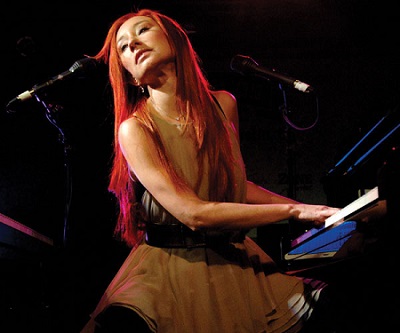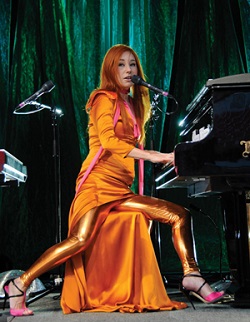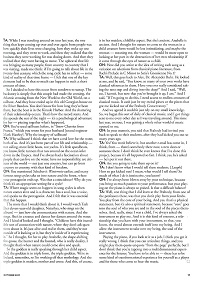|

songs | interviews | photos | tours | boots | press releases | timeline
Opera News (US)
October 2011

Tori Amos Variations
With her new album, Night of Hunters, the inimitable Tori Amos delivers a "twenty-first-century song cycle" riffing on hundreds of years of piano literature. OUSSAMA ZAHR offers a preview.
Before Tori Amos was Tori Amos -- the flame-haired singer–songwriter who reminded an entire generation of listeners that, yes, the piano could be a rock instrument -- she was little Myra Ellen Amos, a five-year-old piano phenom who became the youngest person ever admitted into Peabody Conservatory's preparatory school. Six years later, in 1974, as a defiant eleven-year-old who couldn't read Chopin as well as her older classmates, she wanted to play the Beatles for the conservatory's annual auditions and lost her scholarship. (She went on to name her short-lived '80s hair band Y Kant Tori Read.) Now, nearly two decades into a solo recording career that has already produced eleven studio albums, ranging in style from acoustic to alternative rock to electronica to Celtic, Amos has come full circle with the composition of a classically inspired song cycle, Night of Hunters, which was released last month with the imprimatur of the Deutsche Grammophon label.
In 1992, Amos resurrected the "girl with a piano" act that hadn't been seen in rock music since Carole King, with the confessional, open-diary mode of her acclaimed solo debut, Little Earthquakes. As a composer of songs, she creates beautiful musical fantasies that can feel almost classical in design, thanks to the prominence of the writing for piano, and she addresses intimate subject matter dressed in baroque lyrics. Her playing is impeccable -- her piano of choice is the Bösendorfer, though she has recorded with just about every keyboard she could get her hands on, including the harpsichord, clavichord, harmonium and Hammond B3 organ -- and she can deliver a piano solo that makes an entire arena of fans go apoplectic. Her voice at its peak had a resinous elasticity and a soar at the top of the staff, though now, at forty-eight, she has settled into a folksy midrange.
When OPERA NEWS caught up in August with the American songstress, who records in Cornwall and has a home in Ireland, she was taking a breather from writing a musical for London's Royal National Theatre that, in her own words, she has been working on for "5,000 years."
 OPERA NEWS: What drew you to the form of the song cycle for this album?
OPERA NEWS: What drew you to the form of the song cycle for this album?
TORI AMOS: Well, Deutsche Grammophon approached me to do a project for them. And I met their doctor of musicology, Dr. Alexander Buhr, while I was in the middle of touring and running around in Europe. And he brought me -- I'm going to say it wrong -- Winterreise by Schubert. And he said, "I really want you to study this and think about it, because I think that, number one, since you've been working on this musical for quite a while now, narrative should be a part of your palette. And I think we need a twenty-first-century song cycle with variations on classical themes."
And I kind of looked at him. I said, "You know, you're not asking for a small order, are you?" And he said, "No, I know that. But I think that you're at a place in your life -- don't you want to do something different? Don't you want an adventure?" I said, "Yes, I want an adventure." So, that was the beginning.
ON: Were the songs originally conceived for piano and voice? How did the chamber-music orchestration come into being?
TA: Yes. It was designed from the ground up, compositionally, for piano–vocal, knowing that an octet was going to be a part of it. But I had long talks with John Philip Shenale, the arranger for the octet, and he'd been playing me all kinds of Stravinsky pieces. And we thought that the intimacy of a smaller section would be the right -- we wanted you to feel like you were listening in and almost could imagine yourself there on the River Bandon in Ireland, and that, if it were designed for a huge orchestra, we would lose some of the intimacy.
ON: What is the story of the cycle? You have said the protagonist is "a woman who finds herself in the dying embers of a relationship."
TA: While I was traveling around on tour last year, the one thing that kept coming up over and over again from people was how quickly their lives were changing, how they woke up one morning, and they went to work, and then they realized that the business they were working for was closing down. And then they realized that they were having to move. The upheaval that life was bringing so many people, from country to country that I was visiting, made me think: if I'm going to talk about life in the twenty-first century, which the song cycle has to reflect -- some kind of reality of that time frame -- I felt that one of the key elements had to be that so much can happen in such a short amount of time.
So I decided to have this occur from sundown to sunup. The backstory is simply that this couple had made the crossing, the Atlantic crossing from the New World to the Old World, on a sailboat. And they have ended up in this old Georgian house on the River Bandon. You don't know for how long they've been there, but the boat is in the Kinsale Harbor. And the shattering of their relationship occurs. That's how the record starts. And she spends the rest of the night -- it's a psychological adventure for her -- piecing together what's happened.
ON: You've used sailboats before, in "Snow Cherries from France," which you wrote for your husband [sound engineer Mark Hawley]. Why the imagery of sailboats?
TA: Why sailboats? I think that we have a real love for the water, both of us. And it's just been part of our life and relationship -- not sailing, more little boats, not yachts. It's little speedboats, you know, little runners that run around on the ocean inlet down in the Tropics. And I've always had a fascination about people that can live on the water, have no responsibility, are citizens of the world -- not just one country, but can go from country to country, with that kind of freedom.
ON: You mentioned Schubert's Winterreise earlier, and many famous song cycles take us into nature and the forest, where your protagonist ends up. Was that a coincidence? Why do you think it's an appropriate setting for a cycle?
TA: Where magic seems to happen in song cycles is when nature comes alive and is a character, has a soul, has a voice, and speaks to the protagonist. And I felt that it was essential that this happen.
The more that I would think about it, I would watch Tash [her eleven-year-old daughter, Natashya, who sings on the album] -- just how she communicates with nature. And she sings. She's in a trance and dances her dances around the water. And I kind of looked and I thought, "Children have this incredible sort of connection with nature, where they don't ask questions about it. It's just alive and real in them, and they're not outside of it looking at it, but they're inside of it experiencing it." So I thought, for her to play Anabelle, the shape-shifting fox-goose, the hunter and the hunted, who is really duality, I thought that's when nature could come alive and speak.
So the goddess is really speaking through her child aspect. And the goddess is in triple form, the triple goddess. We're in Ireland, remember, so I'm working off that mythology. And the triple goddess is maiden, mother and crone. And this, of course, is in her maiden, childlike aspect. But she's ancient. Anabelle is ancient. And I thought for nature to come to the woman in a child creature form would be less intimidating, and maybe the woman -- meaning me, the woman -- would be more open to looking at her part in the destruction of her own relationship if it came through the eyes of nature as a child.
ON: How did you arrive at the idea of writing each song as a variation on selections from classical piano literature, from Bach's Prelude in C Minor to Satie's Gnossienne No.1?
TA: Well, this goes back to Alex, Dr. Alexander Buhr. He looked at me, and he said, "You know, so many of your own works have classical references in them. Have you ever really considered taking the next step and diving into the deep?" And I said, "Well, no, I haven't, but now that you've brought it up, I am." And I said, "If I'm going to do this, I need access to endless amounts of classical music. It can't just be my recital pieces or the pieces that got me kicked out of the Peabody Conservatory."
And we agreed it couldn't just rely on my small knowledge. So, we began this sort of daily of classical music, and I got things sent to me every other day as I was traveling around. This time last year, on tour, I was getting a whole other world of music opened to me.
ON: In your memoir, you said that Peabody had invited you back to speak to their students, after they had kicked you out so many years ago.
TA: Yes! You won't believe it, but another e-mail has come in, I think, from -- there's somebody there now, a new dean or someone there. I don't think he even knows that I've done this project, because it's all happened so fast. I think, yes, he's asked -- he's put it out there.
ON: Are you going to take them up on it?
TA: I don't know what I would tell these students. [Laughs] How to get kicked out? I mean, what would I tell them? So much of what I do is instinctive, you know?
ON: I've always been blown away by your technique, because you bring so much passion to your performance, but your playing on the piano is always so poised. Is that a difficult balance?
TA: Well, one thing that I did learn at the Peabody, from one of the professors there, was that you don't play from your limbs. You play from the core of your being. And yes, that's a physical statement, but it's also a spiritual statement, because "core" goes into the soul of who you are and to the soul of the pieces themselves. And, really, since I was a child, I've always asked the instrument to play me. And it is this kind of oneness, a relationship that you have with your instrument, so that, you know, the wood almost extends itself into my being. And I allow the instrument to take over my being, the soul of the instrument.
Playing the piano, if you look at it as a job, I think you get it really wrong. I think that you can articulate things, and you might play them quote-unquote "from the page" perfectly, but I don't think that you're tapping into a multidimensional experience for the listener. You have to be able to -- there has to be some kind of transformational experience for yourself as a player and for those who come to hear the music.
original article
 
[Wikipedia: Opera News]
t o r i p h o r i a
tori amos digital archive
yessaid.com
|